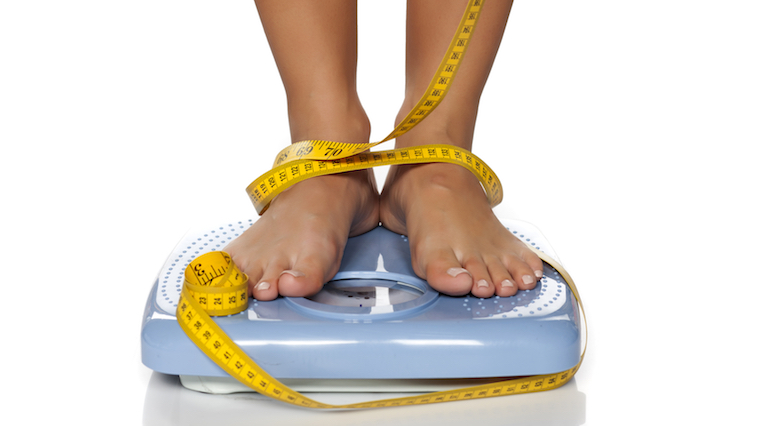Neuroscientist, Sandra Aamodt was a serial dieter whose weight yo-yoed for 30 years – here she explains how she finally broke free
In her new book, ‘Why Diets Make Us Fat,’ which is based on a TED talk that boasts over 3.5 million views, Sandra Aamodt reveals how our obsession with weight loss could actually be making us fatter.
Here, she reveals her personal experience with yo-yo dieting and why she believes that science beats diets.

‘On New Year’s Day in 2010, I made three resolutions. Over the coming year, I wasn’t going to try to lose weight, I wasn’t going to weigh myself, and I was going to exercise every day. Those resolutions are based on the neuroscience of weight regulation, and they worked so well that I’m still following them today.
Like many female dieters, I was within the normal weight range for my height, but I felt too big anyway.
That was a big change for someone who’d been yo-yo dieting for thirty years. I lost weight for the first time when I was thirteen, after my mother scolded me for “eating like a fat person.”
My mother scolded me for “eating like a fat person”
Like many female dieters, I was within the normal weight range for my height, but I felt too big anyway. I had absorbed the idea that women should be very thin, like the models in magazines, so my ordinary body seemed unacceptable.

I took the money I’d earned from delivering newspapers and bought a bunch of low-calorie food like cantaloupes and cucumbers. I kept it in the basement refrigerator, so I wouldn’t be tempted by the tasty food that the rest of the family was eating. By cutting back to 800 calories a day—a goal I may have gotten from the other girls at school or simply invented—for a few weeks, I managed to lose ten pounds. Constant thoughts of food seemed like a fair trade for feeling better about my weight.
In less than a year, I’d regained the weight and felt worse than before
The story didn’t end as I’d imagined it would, with me setting off into my adult life in a new, improved body. Instead it ended as such stories almost always do. In less than a year, I’d regained the weight and felt worse than before. My efforts had come to nothing, I was convinced, because I didn’t have enough willpower to overcome my appetite. I was ashamed, but I didn’t give up. Instead I resolved to try harder.
The next diet ended the same way. So did the one after that. Over the next three decades, I lost and regained the same 10-15 pounds almost every year. Frequent dieting is a risk factor for eating disorders, and eventually it caught up with me.
Frequent dieting is a risk factor for eating disorders, and eventually it caught up with me
When I was in college, under a lot of stress, I started binge eating. Late at night, when I couldn’t sleep, I would devour entire cartons of ice cream or a package of saltines with butter. Even after I’d made myself sick, I didn’t seem to be able to stop eating. Luckily, when the stress eased up, so did the binge eating, but by then I’d gained twenty pounds.
Late at night, when I couldn’t sleep, I would devour entire cartons of ice cream
Of course I knew what to do about that: I went on another diet. That one got out of control. I lost almost fifty pounds by hitting the gym for an hour every morning and limiting myself to six hundred calories a day. My ribs were showing, but I wasn’t happy. I still felt like I needed to be thinner.
My ribs were showing, but I wasn’t happy. I still felt like I needed to be thinner
Eventually my husband managed to convince me to stop starving myself. Once I did, I gradually returned to my normal weight. I was lucky to be able to recover by myself after veering that close to an eating disorder. The scariest part of my story is how common it is: about 20 percent of dieters end up developing some degree of disordered eating.

After I received my Ph.D. in neuroscience, I learned about the research that explains why weight is so hard to change through deliberate effort. There is a system in the brain that is responsible for maintaining body weight within a range of about 10-15 pounds, often called the “set point”, which is different for each individual. The brain’s desired weight range depends on our genes and on life experiences from fetal development through adulthood.
When people go below this range, the brain responds by using every tool available to promote regain. Dieters become hungrier and less active, and their bodies conserve energy by reducing metabolism. Many of us aren’t even aware that we’re eating a bit more than our diets allow or working less hard at the gym—let alone that our bodies are burning less energy—but these subtle changes can add up to a lot of weight over months to years. For that reason, maintaining a substantial weight loss is often more difficult than achieving it in the first place.
My 2010 resolutions were geared toward working with my brain’s weight-regulation system instead of fighting it. Since I learned to pay attention to my body’s signals, which took me about six months, I eat whenever I’m hungry and stop effortlessly when I’m full. By accepting the weight range that my brain thinks is right for me, I’ve been able to enjoy food more while worrying about it less. When I’m not hungry, I can walk past ice cream or chocolate without even noticing it. And when I do overeat at a celebration, I don’t worry about it. I know that I’ll be less hungry over the next few days, so I’ll naturally eat less to make up for the big meal.
By accepting the weight range that my brain thinks is right for me, I’ve been able to enjoy food more while worrying about it less
I’ve also discovered that I appreciate my body a lot more when I’m not preoccupied with trying to change it. Not only have I started to value what my body can do, but I slowly learned to like the way it looks. That attitude has come to me much more easily since I stopped focusing relentlessly on its size and its flaws.
Now that I’m not spending a lot of effort trying to stick to a series of futile diets, I’ve had the energy to optimise my lifestyle to keep myself at the low end of my weight range. Most of us imagine that if we ate whatever we wanted, we’d gain a lot of weight, but I’ve actually lost five or ten pounds through these lifestyle changes.

Small changes add up to big differences when we keep moving in the right direction consistently. In the six years since I quit dieting, I’ve developed a daily habit of meditation and found ways to get exercise that I really enjoy—from walking my dog through the hills to swing dancing. My stress has also become lower because this way of living is more fun. All those changes have been good for both my health and my happiness, and the research suggests that they would probably improve your life too.
EXCITING NEWS: On January 10, Healthista launches our Lean Energy Programme a new range of diet proteins and nutrient powders formulated by nutritionist Rick Hay with ingredients proven to promote weight loss. Click here to register to receive a 10 per cent off voucher
Sandra Aamodt is a neuroscientist and science writer. She is the author of new book Why Diets Make Us Fat: The Unintended Consequences of Our Obsession with Weight Loss.
Her TEDTalk at TEDGlobal2013 about why she stopped dieting and switched to eating mindfully has received over 3.5 million views.
MORE: 8 ways diets can make you fat
Sandra Aamodt is the author of Why Diets Make Us Fat (Scribe, £12.99).
MORE: Best new healthy restaurants in London
MORE: Are you addicted to sugar?
Like this article? Sign up to our newsletter to get more articles like this delivered straight to your inbox.























































